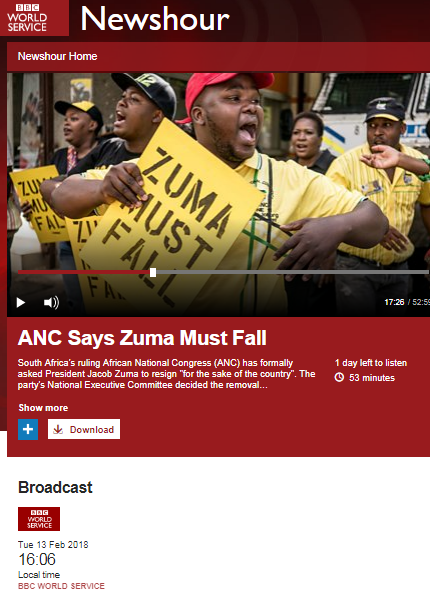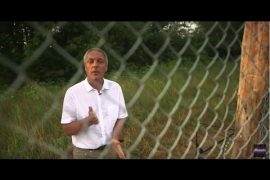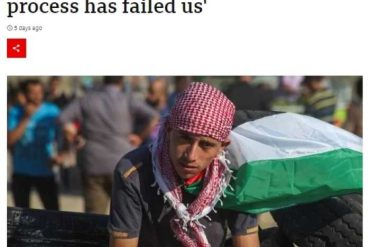The February 13th afternoon edition of the BBC World Service radio programme ‘Newshour‘ included an item described in its synopsis as follows:
“Also in the programme; the trial of a Palestinian teenager who slapped an Israeli soldier and lunged at another has begun in an Israeli military court”
Presenter Julian Marshall also used the terms ‘slapped’ and ‘lunged’ in his introduction to the item (from 14:04 here).
[emphasis in italics in the original, emphasis in bold added]
Marshall: “Now, so the trial of a Palestinian teenager who slapped an Israeli soldier and lunged at another has begun in an Israeli military court. Ahed Tamimi, aged 17, is charged with 12 offences including assaulting security forces and incitement to violence. If convicted, she could face a lengthy jail term.”
Marshall then went on to introduce a recording of a statement made by Tamimi’s lawyer – who has been featured in two previous BBC reports by Yolande Knell.
Marshall: “The case of Ahed Tamimi is being heard behind closed doors on the judge’s orders as the 17 year-old is being tried as a minor. Speaking to reporters outside the court, Miss Tamimi’s lawyer Gabi Lasky criticised the decision to close the trial to the public.”
Lasky: “The court decided what is good for the court and not what is good for Ahed. They understand that people outside of the military court are interested in Ahed’s case. They understand that her rights are being infringed and her trial is something that shouldn’t be happening. So the way to keep it out of everybody’s eyes is to close doors and not allow people inside the court for her hearings.”
A report by the Times of Israel provides some background to the statement from Lasky which the BBC chose to promote.
“Lasky popped out of the courtroom to provide a quick statement to reporters — in English, of course — expressing her outrage over the ruling.
The attorney explained that upon returning inside chambers, she would argue that because Israel’s occupation of the Palestinian people is illegal, the military court hearing Tamimi’s case was illegitimate as well.
The line of defense appeared to establish an uphill battle for Lasky in that it required the judge to denounce his own authority in order to rule in Tamimi’s favor.
But her audience outside the caravan, didn’t seem concerned as they nodded their heads in approval of the defense.”
Marshall next introduced the BBC’s Rome correspondent who appears, once again, to have been temporarily reassigned to the Middle East.
Marshall: “Well let’s speak now to the BBC’s James Reynolds live in Jerusalem and James, remind us of the facts of this case – those, that is, that are not disputed.”
Reynolds: “Right, let’s take you back to December tw…last year in her West Bank village – the Palestinian village of Nabi Saleh. There are around 600 people live there. They often periodically every Friday have clashes with Israeli soldiers and at one point on the 15th of December, mobile phone footage shows her confronting and speaking to two Israeli soldiers on the outskirts of the driveway of her family home. And the mobile phone footage – which I’m sure a lot of people have seen – shows her arguing. It shows her first trying to hit one soldier – I think on the arm – and then she slaps him on the face. He doesn’t react. She then moves towards the second soldier and is eventually separated from them. Israel says that that mobile phone footage is enough evidence – it is enough proof of assault – to put her on trial along with a number of other incidents. But Palestinians of course see it very differently.”
Given that Reynolds was asked to state “the facts of this case”, it is of course remarkable that he failed to mention that the Friday “clashes” in Nabi Saleh are organised by Ahed Tamimi’s father and extended family or that the mobile phone footage he partially describes was filmed by her mother Nariman and live-streamed on Facebook. All the more significant is the fact that he failed to inform listeners of Ahed Tamimi’s “message to the world” – as defined by her mother – in that same footage which included the call for violence that is the basis for the charge of incitement against her.
“Whether it is stabbings or suicide bombings or throwing stones, everyone must do his part and we must unite in order for our message to be heard that we want to liberate Palestine”
Those highly relevant omissions facilitated subsequent trivialisation of the charges against Ahed Tamimi by both Marshall and Reynolds.
Marshall: “It seems – well ehm…I suppose it depends on your perspective – but a relatively minor offence to be tried in front of a military court.”
Reynolds: “Yes and it does sound incredibly surprising when you think of an army – a hugely powerful army – why it would be spending its time prosecuting what on any judgement is a relatively minor misdemeanour. “
In addition to incitement, the charges against Ahed Tamimi include two counts of aggravated assault of a soldier, two counts of stone-throwing, two counts of threatening a soldier and four counts of obstructing a soldier in execution of his duty. In the UK, the charge of obstructing or assaulting a police officer would not be considered “a relatively minor misdemeanour” – i.e. a non-indictable offence – as the BBC well knows.
Displaying his ‘expertise’ by twice inaccurately describing the IDF as “a volunteer army”, Reynolds then went on to bizarrely suggest that the charges against Ahed Tamimi are steered by public mood rather than by the law and to further trivialise her actions.
Reynolds: “But Israelis say it’s about more than that. It is about soldiers. The key thing from Israel’s point of view is this: the army is at the heart of the society here. It is a volunteer army – a lot of Israelis can identify themselves with those soldiers. There’s been praise for the fact that they didn’t react and there’s been a thought among some in Israel that you have to stand up for those soldiers, who are clearly identifiable with the rest of the population, and you have to protect them against insults – however trivial those insults may be. That might be an explanation which is very difficult to understand outside Israel but here, because of the centrality of a volunteer army to society, it is perhaps more understandable.”
Marshall: “And very briefly, James, what kind of sentence could she face if convicted?”
Reynolds: “If convicted of all crimes, essentially she could be looking at around a year in jail if found guilty.”
This is the BBC’s twelfth report (at least) on Ahed Tamimi in less than two months and the third to appear on ‘Newshour’. Only one of those reports – on the BBC’s domestic channel Radio 4 – has provided audiences with any sort of information concerning the background to the charge of incitement against Ahed Tamimi.
In other words, this report continues the editorial policy of providing BBC audiences worldwide with a trivialised and one-sided portrayal of the story which resembles activism more than journalism.
Related Articles:
BBC News website promotes the Tamimi clan again
BBC News omits a relevant part of the Tamimi charges story
BBC radio’s inconsistent coverage of charges against Ahed Tamimi
BBC’s Knell reports on the Tamimi case again – and raises a question
BBC’s Bowen diverts Ahed Tamimi story with a disingenuous red herring
Jeremy Bowen’s Tamimi PR continues on BBC World Service radio
BBC continues its campaigning with eleventh report on Ahed Tamimi




